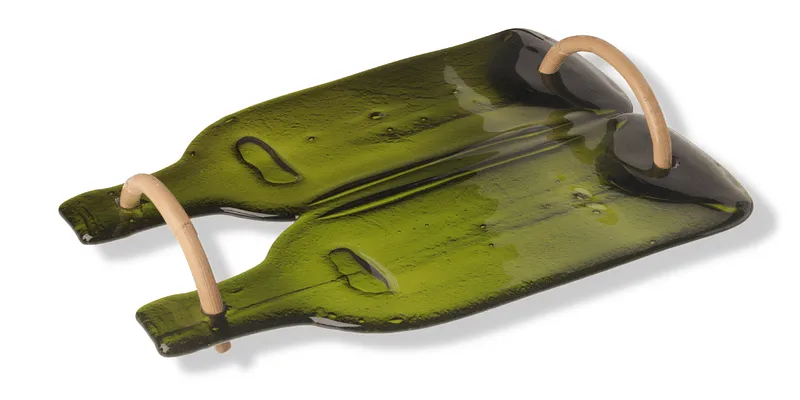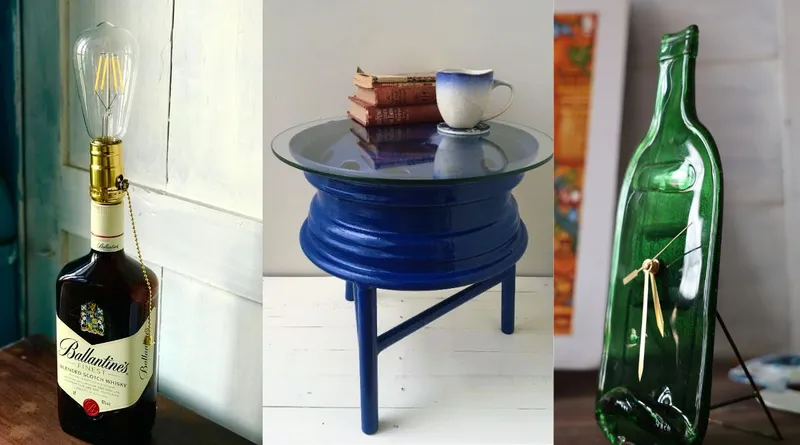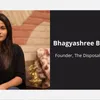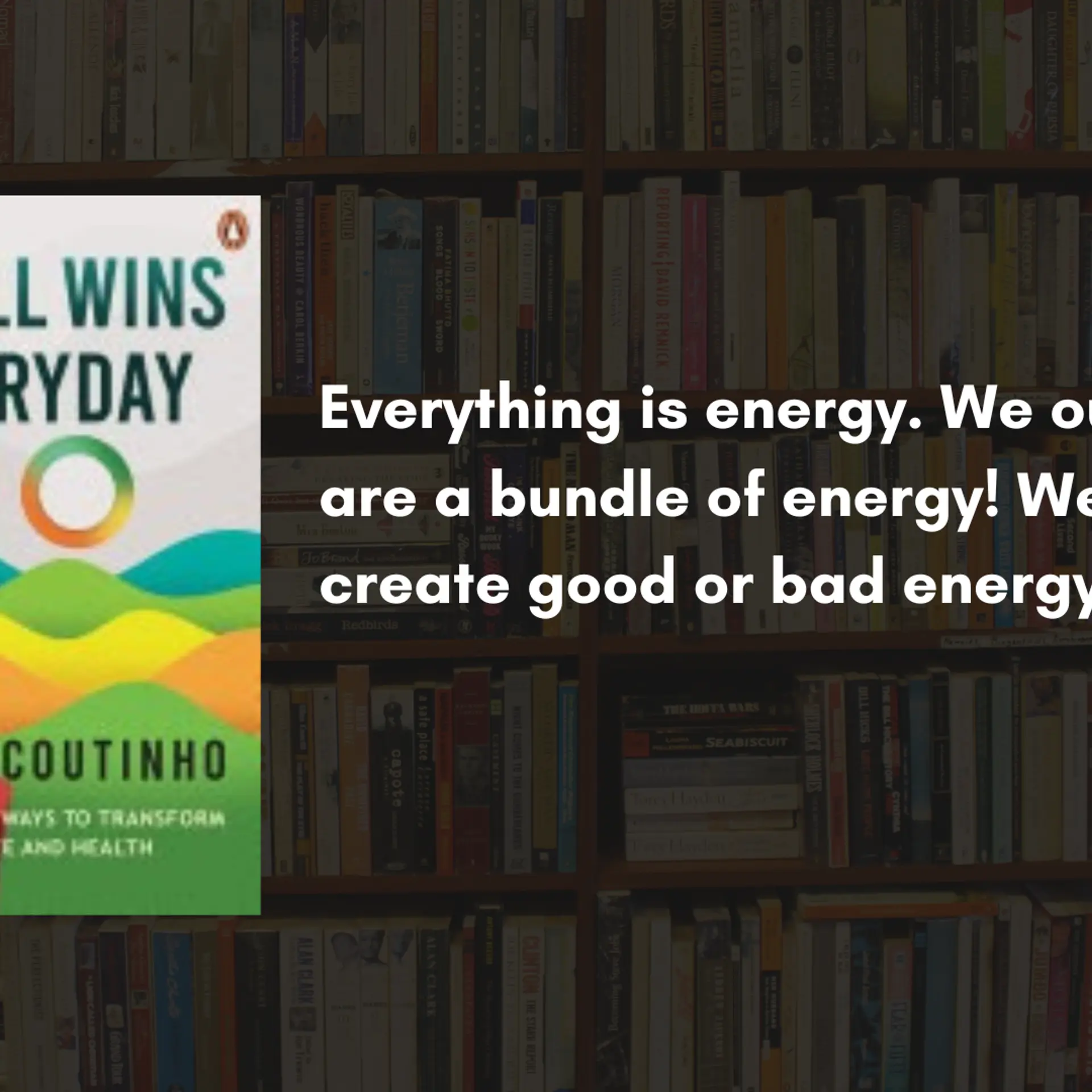This Kochi woman is upcycling scraps and glass waste into art
Vapasee, a Kochi-based startup, has upcycled 21,000 glass bottles, 5,000 coconut shells, over 800 kg of wood, and more than 500 kg of metal waste into home decor items and art pieces.
In 2015, 34-year-old Renjini Thampi returned from Dubai, leaving her seven-year-long career to start afresh in India. Settling down in Kochi with her husband, Nikhil Varma—an artist running a folly studio—Thampi became his accomplice in the hunt for scrap materials and old instruments for his creative projects.
While Thampi was sheltered from India’s harsh reality of waste disposal and pollution, she had a reality check upon moving to Kochi when she saw a staggering amount of waste discarded in landfills.

Her artistic intuition led her to realise the potential of the tons of waste as the duo scoured multitudes of scrap dealers for these discarded items. She explored ways to repurpose the scrap materials into something useful, beautiful, and environmentally conscious.
Starting with a tire rim table, simple bottle art, and pen stands made of old cassettes, Thampi—who wanted “to bring back waste to life”—established Vapasee in 2021.
The Kochi-based startup focuses on upcycling glass bottles into home decor and art pieces, including lamps, side table decorations, wall hangings, platters, clocks, and more.
So far, Thampi has upcycled 21,000 glass bottles, 5,000 coconut shells, over 800 kg of wood, and more than 500 kg of metal waste to make home decor items and art pieces.
“To start with, I stopped seeing it as discarded waste. Instead, I identified it as an opportunity to give back to the environment while living my passion for art, which changed everything for me,” she tells SocialStory.
The first steps
Thampi, brought up and educated in Dubai, worked in various fields, including aviation, HR, and the media industry, for seven years before shifting to India.
Although she had a keen interest in art and painting since childhood, she pursued it more as a hobby. But her interest was piqued when she learnt Kerala mural paintings.
“After learning Kerala mural painting, I developed a strong interest in pursuing arts professionally,” she says, adding she later received coaching in acrylic painting to develop her skills.
Thampi decided to take a break from her career and pursue art professionally after she returned to India. She created paintings and showcased them in exhibitions while networking with individuals in the art industry.
While initially, she did not prioritise sustainability in her artistic pursuits, recognising the potential of discarded waste materials was very different.

Glass platters
It led her to delve deeper into amalgamating art with sustainability, and she began exploring new ways to intertwine scrap materials into her artwork, making “quirky and sustainable” products.
“I noticed some of the scrap materials like metals are very useful to the scrap collectors. However, substances like discarded plastic and glass eventually end up in landfills. Therefore, I kept collecting such substances and tried to transform them into a utility product,” she says.
Elucidating further, she says, “Initially, I started designing products with whatever scrap I got, but since I was all over the place, I decided to focus on one material—glass.”

Thampi sent her products to friends and family and received mixed feedback and suggestions, which helped her fine-tune her products for potential customers.
In 2020, she became a member of the Climate Collective launch pad—an NGO focused on empowering climate entrepreneurs—wherein she received relevant market knowledge, business growth, and ways to create environmental impact.
However, the road has not been a bed of roses for Thampi.
As soon as she started her startup in 2021, the COVID-19 pandemic hit. “We could barely do any business because of the lockdown. But I did not get disheartened. Instead, I applied for IIM Bengaluru’s programme for startup incubation, where I got selected,” she recalls.
Under the programme, she received aid in ideation, prototyping, and understanding the market from experts. She was also given a small grant, enough for her to kickstart her business.
While Thampi’s parents supported her decisions, they had their fair share of doubts when she started up. She recalls her mother asking, “You had a good job back then, and now you want to work with scrap?”
Despite this initial hesitation, her parents eventually supported her endeavour. “I believed in my business, but when others, especially strangers, showered their trust in my brainchild, I felt I was on the right track,” she says.
Where art meets sustainability
Bootstrapped startup Vapasee provides a wide range of products for home decor, including planters, windchimes, clocks, flower vases, containers, and more. Besides these decor items, the startup offers a range of utility products like upcycled drinking glasses, platters, candles, and custom-made jewellery.
Thampi collects scrap materials from clean-up drives, where she urges people to send their glass waste to her studio. The brand also has tie-ups with local waste management organisations and scrap dealers, who provide her with the required materials.
Once the collection is done, the startup—at its 2,000 square feet manufacturing unit in Kochi—segregates the glass bottles according to their brands and sizes, cleans, upcycles, and stores them.
Before the final packaging, Vapasee’s team of ten artisans design and give the final touches to the products.
The brand also ties up with local women’s self-help groups and offers them employment for cleaning work. It also follows a batch production system, wherein a batch can vary from 100 to 200 products.
Besides selling to consumers, Vapasee has a B2B channel, where it caters to corporate clients for gifting purposes and restaurants for glass products, including platters and glasses.

According to Thampi, Instagram is the most important sales platform for the brand, followed by online marketplaces such as Amazon, Onegreen, Brown Living, Loopify, and Magikelf. Further, it has three offline stores in Kerala. The startup will soon launch its website.
Thampi is looking forward to expanding its presence in Tier I cities, including Bengaluru, Delhi, and Mumbai, by selling its products in boutique retail stores.
So far, the brand has sold over 5,000 products, and the prices vary between Rs 300 and Rs 3,000. In 2023, it aims to expand its customer base to more than 7,000 people. Furthermore, the brand wants to upcycle around 50,000 glass bottles this year while launching new coconut and natural fibre-made products.
“Through this brand, I wish to create utility products with an artistic twist while giving back to the environment,” she says.
Edited by Suman Singh







